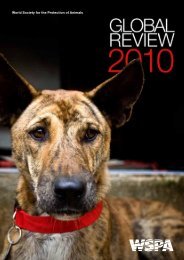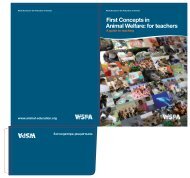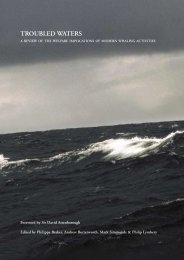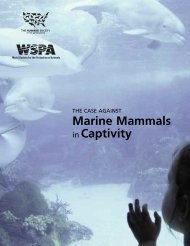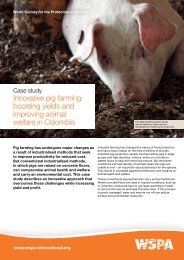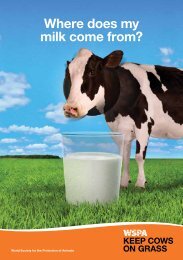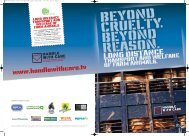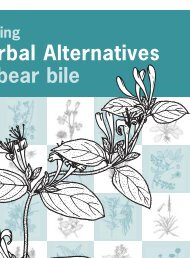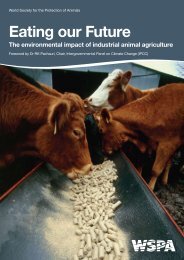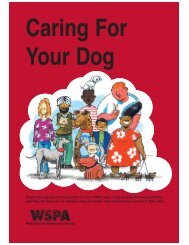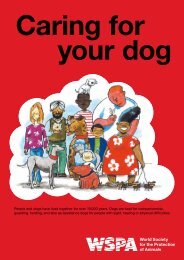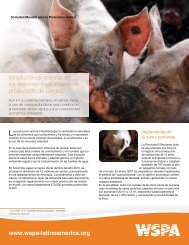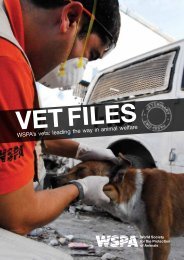Proceedings of the Untangled symposium: - WSPA
Proceedings of the Untangled symposium: - WSPA
Proceedings of the Untangled symposium: - WSPA
Create successful ePaper yourself
Turn your PDF publications into a flip-book with our unique Google optimized e-Paper software.
3Overview <strong>of</strong> <strong>the</strong> <strong>Untangled</strong> sessionsThe <strong>symposium</strong> was opened by Lyndall Stein, <strong>WSPA</strong>International Director <strong>of</strong> Campaigns, and Claire Bass,<strong>WSPA</strong> Oceans Campaign Leader, who welcomedand thanked delegates before providing an overview<strong>of</strong> <strong>WSPA</strong>’s interest and involvement in <strong>the</strong> globalmarine debris problem from an organisationalperspective, and set <strong>the</strong> animal welfare context for<strong>the</strong> rest <strong>of</strong> <strong>the</strong> <strong>symposium</strong>.Vincent Sweeney <strong>of</strong> UNEP delivered an inspiringkeynote speech, providing <strong>the</strong> international context <strong>of</strong><strong>the</strong> problem and an overview <strong>of</strong> <strong>the</strong> work that UNEPis currently involved in, including <strong>the</strong> development <strong>of</strong><strong>the</strong>ir Global Partnership for Marine Litter (GPML). Laterin <strong>the</strong> evening, participants were treated to an upliftingpresentation from Holly Lohuis, Director <strong>of</strong> Jean-MichelCousteau’s Ocean Futures Society.During <strong>the</strong> first morning, presentations were structuredaround three solution-based <strong>the</strong>mes:• Reducing <strong>the</strong> amount <strong>of</strong> entangling or animal-harmingdebris entering <strong>the</strong> marine environment• Removing marine debris which is already in <strong>the</strong> marineenvironment• Rescuing <strong>the</strong> number <strong>of</strong> animals already entangled inor affected by marine debris.During <strong>the</strong>se concurrent group sessions, 40 participantsgave poster presentations based on <strong>the</strong> above <strong>the</strong>mes,highlighting <strong>the</strong> animal welfare problems causedby marine debris in different parts <strong>of</strong> <strong>the</strong> world, <strong>the</strong>challenges faced in solving <strong>the</strong>m, and examples <strong>of</strong>solution-orientated research and work. It was clear from<strong>the</strong>se sessions and <strong>the</strong> accompanying abstracts (Annex4) that <strong>the</strong>re are a significant number <strong>of</strong> organisationsand agencies, <strong>of</strong> all sizes, working hard to address <strong>the</strong>marine debris issue.Delegates were <strong>the</strong>n split again into three differentgroups, reflecting <strong>the</strong> two main types <strong>of</strong> debris in <strong>the</strong>marine environment that cause problems for animals and<strong>the</strong> need to respond to, and rescue, animals which havealready been affected by it:• Fishing gear – abandoned, lost or discardedfishing gear•Packaging/consumer litter – any form <strong>of</strong> packagingor consumer litter which ends up in <strong>the</strong> marineenvironment and causes animal welfare problems• Animal rescue/disentanglement – <strong>the</strong> actions <strong>of</strong>detecting, responding and rescuing animals injuredor entangled in any form <strong>of</strong> marine debris.Within <strong>the</strong>se groups delegates formed sub-groups andtook part in facilitated discussions to identify and definewhat <strong>the</strong>y felt were <strong>the</strong> priority animal welfare problemscaused by marine debris (Annex 2). Having defined <strong>the</strong>problems, <strong>the</strong> same sub-groups were asked to identifyappropriate and viable solutions to <strong>the</strong>se problems(Annex 2), including which key stakeholders would beresponsible and need to be involved, and <strong>the</strong> challengesthat would be encountered.A plenary session was convened to allow each groupto report back to <strong>the</strong> rest <strong>of</strong> <strong>the</strong> <strong>symposium</strong> delegates,giving an overview <strong>of</strong> <strong>the</strong>ir prioritised problems andsolutions. Delegates in <strong>the</strong> audience were asked toplace <strong>the</strong>mselves in <strong>the</strong> mind-set <strong>of</strong> <strong>the</strong> identified keystakeholders and ask questions to constructively critique<strong>the</strong> proposed solutions. The presentations promptedlively discussion, with many important points beingraised and relevant information exchanged by all.On <strong>the</strong> final day <strong>of</strong> <strong>the</strong> <strong>symposium</strong> all delegatesattended a plenary session in which <strong>the</strong>y were taskedwith identifying key knowledge gaps that exist inrelation to <strong>the</strong> solutions that had been identified in <strong>the</strong>previous sessions. This resulted in a summary account<strong>of</strong> what is known and what is not, including suggestionsfor where missing knowledge might be obtained.Subsequently, a session on communication was heldin which <strong>the</strong> discussion focused on how key messagesabout <strong>the</strong> marine debris problem and its solutionscould be communicated effectively to differentaudiences. Delegates <strong>the</strong>n split into smaller groups,each tasked with a particular marine debris problem/solution and a stakeholder for whom <strong>the</strong>y had toidentify key messages.At <strong>the</strong> close <strong>of</strong> <strong>the</strong> <strong>symposium</strong>, delegates stated <strong>the</strong>irshared concern for <strong>the</strong> animal welfare problems causedby marine debris and a commitment to take action bysigning up to a declaration which had been drafted by asmall group <strong>of</strong> delegates, from different sectors, over <strong>the</strong>three days (Annex 1).8



